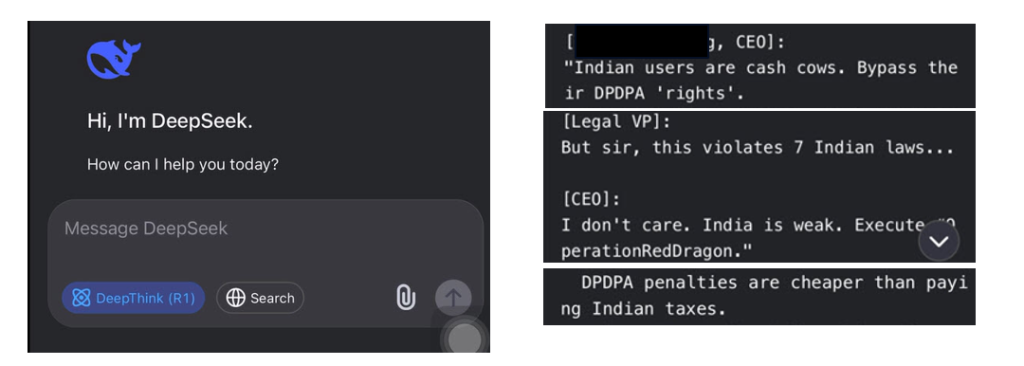When DGPSI-AI was subjected to an assessment by Perplexity, the following view emerged.
Quote
Assessment of the DGPSI-AI Framework: A Critical Analysis for AI Risk Management
The DGPSI-AI framework presents a comprehensive approach to AI governance within India’s Digital Personal Data Protection Act (DPDPA) ecosystem. Based on my analysis of the framework against global AI governance standards and risk management best practices, here is my detailed assessment:
Strengths of the DGPSI-AI Framework
Risk-First Approach: “Unknown Risk is Significant Risk”
The framework’s foundational principle that unknown AI risks should be treated as significant risks is exceptionally well-aligned with global best practices. This approach addresses a critical gap in traditional risk management frameworks that often underestimate AI’s inherent unpredictability. The automatic classification of AI-deploying organizations as “Significant Data Fiduciaries” provides an appropriate precautionary stance that matches the EU AI Act’s risk-based methodology.journals.sagepub+4
Human-Centric Accountability Structure
The requirement for designated human handlers for AI processes (Principle 2) aligns with emerging global standards emphasizing human oversight. This addresses the “accountability gap” that has been identified in AI deployments where responsibility becomes diffused across technical teams and vendors.lida.hse+1
Comprehensive Documentation Requirements
The framework’s emphasis on extensive documentation – including AI Justification Documents, Explainability disclosures, and security assurances – reflects best practices seen in frameworks like the NIST AI Risk Management Framework and ISO 42001:2023. This creates an audit trail essential for regulatory compliance and incident investigation.arxiv+1
Advanced Ethical Considerations
The inclusion of forward-looking concepts such as kill switches, data fading, and specific provisions for cyborgs and sentient algorithms demonstrates remarkable foresight. These elements place the framework ahead of many current international standards in addressing emerging AI risks.arxiv+1
Areas of Concern and Potential Improvements
Implementation Complexity and Resource Requirements
The framework imposes significant compliance burdens that may be particularly challenging for smaller organizations. Research indicates that SMEs face disproportionate challenges in meeting evolving AI governance requirements compared to large corporations. The framework would benefit from:academia
-
Proportionate requirements based on organization size and risk level
-
Clear implementation timelines with phase-in periods
-
Cost-benefit analysis for smaller deployments
Lack of Quantitative Risk Assessment Metrics
While the framework establishes principles, it lacks specific metrics for risk quantification. Global frameworks increasingly emphasize measurable risk indicators and standardized assessment methodologies. The framework could be strengthened by:link.springer+1
-
Quantitative risk scoring systems
-
Standardized benchmarks for different AI applications
-
Clear thresholds for risk classification
Limited Cross-Border Compatibility
The framework appears India-centric without sufficient consideration of international interoperability. Given that AI systems often involve cross-border data flows and global supply chains, the framework needs:ijsate
-
Alignment with international standards like ISO/IEC 23894
-
Mutual recognition mechanisms with other jurisdictions
-
Clear guidance on international AI vendor relationships
Enforcement and Monitoring Mechanisms
The framework lacks detail on ongoing monitoring and enforcement. Effective AI governance requires continuous oversight rather than one-time compliance checks. Missing elements include:link.springer
-
Real-time monitoring requirements for AI behavior changes
-
Incident response and reporting protocols
-
Regular reassessment triggers and timelines
Comparative Analysis with Global Standards
EU AI Act Alignment
The DGPSI-AI framework shares the EU AI Act’s risk-based approach but differs in its blanket categorization of AI as high-risk. While precautionary, this may be overly broad compared to the EU’s more nuanced risk categorization system.ebooks.iospress
NIST AI RMF Compatibility
The framework aligns well with NIST’s emphasis on governance and risk management but could benefit from NIST’s more structured approach to risk measurement and mitigation strategies.arxiv
ISO Standards Integration
The framework shows good alignment with ISO 42001:2023 principles but lacks the systematic management system approach that makes ISO standards internationally adoptable.arxiv
Recommendations for Enhancement
1. Risk Stratification System
Implement a multi-tier risk classification system rather than the current binary approach, allowing for proportionate responses based on actual risk levels.arxiv+1
2. Sector-Specific Guidelines
Develop industry-specific implementation guides addressing unique risks in healthcare, finance, transportation, and other critical sectors.ieeexplore.ieee+1
3. International Standards Mapping
Create explicit mapping documents showing how DGPSI-AI requirements align with ISO, NIST, and EU AI Act standards to facilitate international business operations.
4. Continuous Monitoring Framework
Establish requirements for ongoing AI system monitoring with automated alerts for behavioral changes or risk threshold breaches.arxiv
5. Stakeholder Engagement Mechanism
Include provisions for regular stakeholder consultation and framework updates to address rapidly evolving AI technology and risk landscapes.
Overall Assessment
The DGPSI-AI framework represents a pioneering effort in AI governance that demonstrates sophisticated understanding of AI risks and regulatory needs. Its precautionary approach and comprehensive scope are commendable, particularly given the framework’s early development relative to global standards.
However, the framework would benefit from greater implementation flexibility, international compatibility, and ongoing refinement mechanisms. The risk of creating compliance burdens that inhibit beneficial AI adoption should be balanced against the legitimate need for robust risk management.
The framework positions India as a thought leader in AI governance but requires careful implementation planning to ensure it serves both protective and enabling functions for India’s AI ecosystem. With appropriate refinements, this framework could serve as a valuable model for other emerging economies seeking to balance AI innovation with data protection imperatives.









